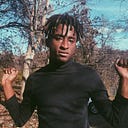The Deadly Side of Activism
‘Revolutionary Suicide,’ the title of Huey Newton’s memoir, speaks to what can happen when activists lose themselves in the struggle
Update 6/7/22: Level has a new home. You can read this article and other new articles by visiting LEVELMAN.com.
 On February 8, 2016, MarShawn McCarrel texted his mother, “Hey Mom. I love you.” Later that day, he took his own life on the steps of the Ohio Statehouse in Columbus.
On February 8, 2016, MarShawn McCarrel texted his mother, “Hey Mom. I love you.” Later that day, he took his own life on the steps of the Ohio Statehouse in Columbus.
He was 23 years old.
McCarrel was a well-known artist and activist in the capital city and beyond. He performed spoken word throughout the city, founded multiple community activist groups, and worked heavily with statewide organization Ohio Student Association. Yet, he also struggled, fighting to find his place as a Black man in the U.S. while also working to topple its oppressive institutions. Ultimately, he succumbed to that struggle. “My demons won today. I’m sorry,” read his last Facebook post.
In his famed 1973 memoir, Revolutionary Suicide, Black Panther Party co-founder Huey Newton describes the titular concept as the willingness to die for political liberation. It was much more than a theory; as the Black Panthers were systematically targeted and infiltrated by J. Edgar Hoover’s FBI and other law…

